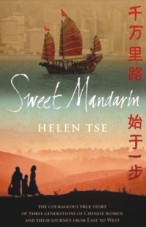Book Review
 
Sabrina F Ahmad
Sweet Mandarin
 I first saw her broad grin on a video screen in Oxford. When asked to define what 'Britishness' was, she cheekily replied 'BBC. British-born Chinese'. I met her shortly afterwards, but our brief acquaintanceship was limited to a 'good morning' at the breakfast table, or a nod and a smile if we passed each other by. I first saw her broad grin on a video screen in Oxford. When asked to define what 'Britishness' was, she cheekily replied 'BBC. British-born Chinese'. I met her shortly afterwards, but our brief acquaintanceship was limited to a 'good morning' at the breakfast table, or a nod and a smile if we passed each other by.
Yet I feel I know her very well. Her extraordinary family, the story of their arduous journey from mainland China to Hong Kong, and finally, the UK, the hardships they faced along the way…I'm quite familiar with it. How, you ask? I happen to have read her book.
Sweet Mandarin is the legacy of three generations of a family, who defied all odds to find success and prosperity in a new land. It is the story of Helen Tse, and her family. It is also a story about indomitable spirit in the face of crushing adversity, rich with the exotic flavours of the food that saved them.
Towards the beginning of her novel, Tse relates the fable of the old man who wished to move a mountain to build a road. Ignoring nay-sayers and sceptics, he laboured all his life, and then, when he passed on, left the job to his successors, who in turn passed the responsibility to their offspring, so that, five generations later, the mountain had been moved, and the road was built.
The story of Tse's family is no less amazing. In Sweet Mountain, we see how her great-grandfather Leung, takes a gamble and goes into the soya sauce business, which takes him and his family out of their humble beginnings in the backwaters of mainland China, into the thriving 1930's Hong Kong. The happiness they enjoy is brief, because Leung is murdered, and the family rendered bankrupt. Tse's grandmother, Lily, manages to rise to the occasion by finding work as an amah at the numerous European houses in the-then British Colony. A sad twist of fate, and a touch of lady luck go hand-in-hand to take Lily and her family from there to the UK, where the Kwoks became one of the first Chinese families in Manchester. The remarkable Lily single-handedly built a thriving restaurant, Lung Fung, where Tse's mother Mabel was raised. When Lily lost Lung Fung, Mabel and her husband Eric went into the catering business, continuing the family ties to food, which always came to their rescue. It was in this environment that Helen, her twin Lisa, and her younger sister Janet, were born and raised. Despite the fact that their lives were more comfortable than that of their ancestors, the Tse sisters had to deal with their share of troubles, not least of which was learning to be comfortable with their identity, being neither wholly British nor wholly Chinese. Despite being successful in their chosen fields, the three sisters ultimately went on to take up the family trade, and in 2004, opened their award-winning restaurant Sweet Mandarin.
The novel reads like a Sidney Sheldon, filled with suspense and unexpected twists, but the thrill of reading this is in knowing that the strong and wonderful women that form the central characters are real people, and this is a true story. Tse has a simple narrative style that makes for comfortable reading, and her description of the various Chinese dishes will make your mouth water, while her message, 'never give up', will fill you up with hope.
So for all the cynics out there who think rags-to-riches stories happen only in the movies, I'd definitely recommend this book!
Copyright (R) thedailystar.net 2007 |
